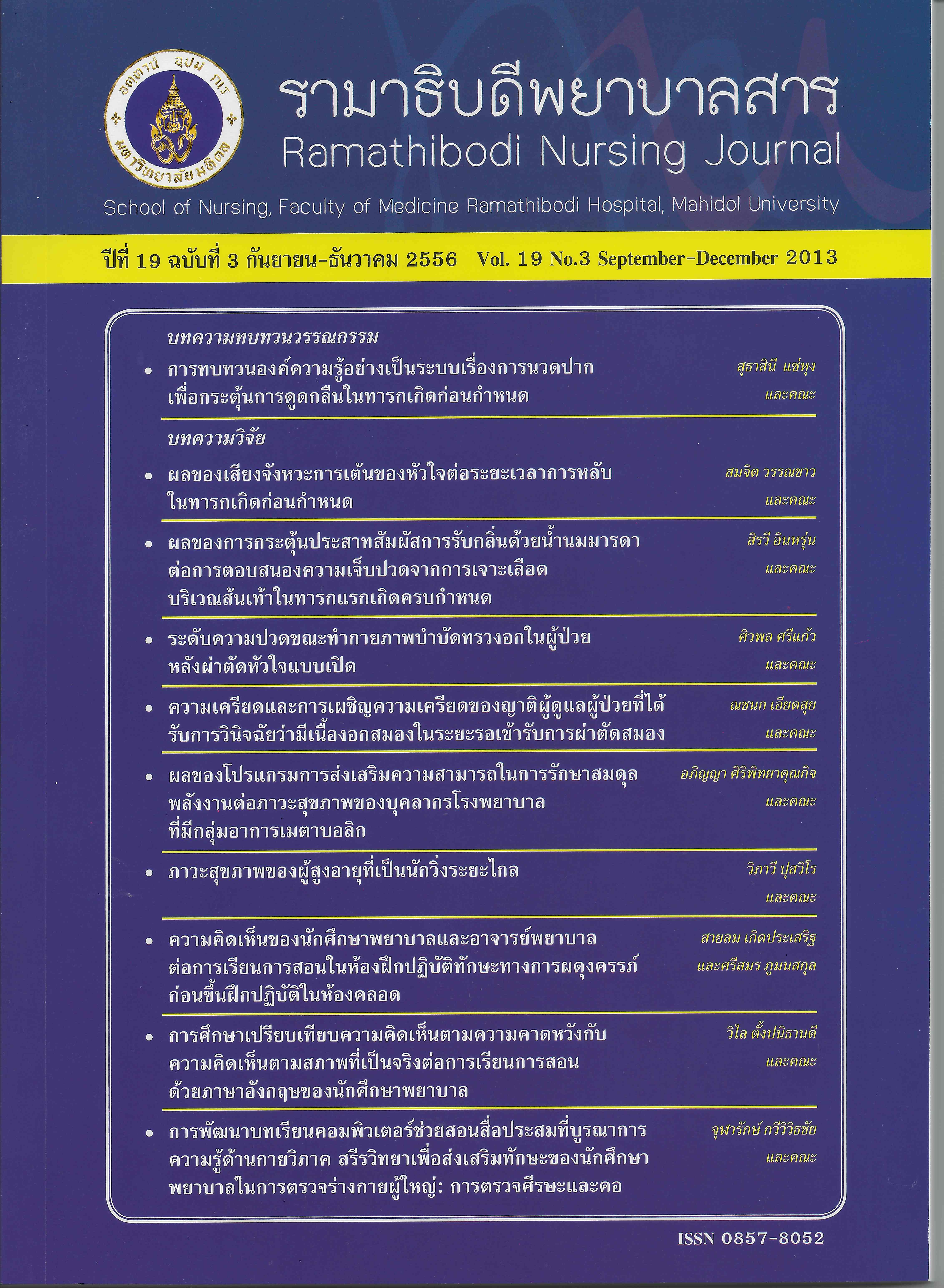ผลของโปรแกรมการส่งเสริมความสามารถในการรักษาสมดุลพลังงานต่อภาวะสุขภาพของบุคลากรโรงพยาบาลที่มีกลุ่มอาการเมตาบอลิก
Main Article Content
Abstract
บทคัดย่อ:
กาารวิจัยกึ่งทดลองครั้งนี้มีวัตถุประสงค์เพื่อศึกษาผลของโปรแกรมการส่งเสริมความสามารถในการรักษาสมดุลพลังงานต่อภาวะสุขภาพของบุคลากรโรงพยาบาลที่มีกลุ่มอาการเมตาบอลิก โดยใช้แนวคิดการดูแลตนเองของโอเร็มเป็นกรอบแนวคิดในการวิจัย กลุ่มตัวอย่างคือ บุคลากรในโรงพยาบาลจำนวน 29 ราย ที่มีอายุ 35 ปีขึ้นไป คัดเลือกแบบเฉพาะเจาะจง โดยมีความผิดปกติของกลุ่มอาการเมตาบอลิก อย่างน้อย 3 องค์ประกอบ ตามเกณฑ์ของโครงการศึกษาคอเลสเตอรอลของสหรัฐอเมริกา (National Cholesterol Education Program ATP III) โปรแกรมการส่งเสริมความสามารถในการรักษาสมดุลพลังงานประกอบด้วย 1) การสนับสนุนและให้ความรู้ 4 สัปดาห์เกี่ยวกับกลุ่มอาการเมตาบอลิกและการควบคุม 2) การให้คำปรึกษาติดตามทางโทรศัพท์ 4 สัปดาห์ ประเมินผลโดยการวัดภาวะสุขภาพ ประกอบด้วย สัดส่วนร่างกาย (น้ำหนักเส้นรอบเอว ดัชนีมวลกาย) ระดับไตรกลีเซอไรด์ และระดับคอเลสเตอรอลชนิดเอชดีแอล และระดับน้ำตาลในเลือดหลังอดอาหารเช้า ก่อนเริ่มโปรแกรมและหลังสิ้นสุดโปรแกรม ในสัปดาห์ที่ 4, 8, และ 12 วิเคราะห์ข้อมูลโดยใช้สถิติเชิงพรรณนา การวิเคราะห์ความแปรปรวนแบบวัดซ้ำทางเดียว และการวิเคราะห์ความแปรปรวนร่วม ผลการวิจัยพบว่า กลุ่มทดลองและกลุ่มควบคุมมีเพศ อายุ สัดส่วนของร่างกาย ผลเลือดก่อนเข้าโปรแกรมไม่แตกต่างกัน ยกเว้นกลุ่มทดลองมีระดับคอเลสเตอรอลชนิดเอชดีแอลสูงกว่ากลุ่มควบคุมหลังสิ้นสุดโปรแกรม พบว่าน้ำหนักตัวของกลุ่มทดลองในสัปดาห์ที่ 8 และ 12 ลดลงมากกว่ากลุ่มควบคุมอย่างมีนัยสำคัญทางสถิติ นอกจากนี้ พบว่าทั้งสองกลุ่มมีแนวโน้มของเส้นรอบเอว ค่าดัชนีมวลกาย ระดับไตรกลีเซอไรด์ และระดับน้ำตาลในเลือดหลังอดอาหารเช้าลดลงแต่ไม่แตกต่างอย่างมีนัยสำคัญทางสถิติ ซึ่งการลดลงของปัจจัยเหล่านี้อาจใช้เวลานานกว่าการลดของน้ำหนักตัว โปรแกรมและเวลาไม่มีอิทธิพลร่วม(interaction) ต่อตัวแปรตาม และการเปลี่ยนแปลงของเส้นรอบเอว ค่าดัชนีมวลกาย ระดับไตรกลีเซอไรด์ระดับคอเลสเตอรอล ชนิดเอชดีแอล และระดับน้ำตาลในเลือดหลังอดอาหารเช้า ทั้งสองกล่มุ ในแตล่ ะช่วงเวลามีแบบแผนไม่แตกต่างกัน ผลจากการวิจัยครั้งนี้สรุปว่าโปรแกรมการส่งเสริมความสามารถในการรักษาสมดุลพลังงานสามารถนำไปใช้ในการปรับเปลี่ยนพฤติกรรมการดูแลตนเอง และช่วยในการลดน้ำหนัก ซึ่งน่าจะเป็นจุดเริ่มต้นในการมีพฤติกรรมและผลลัพธ์ทางสุขภาพที่ดี และควรมีการติดตามในระยะยาว
คำสำคัญ: กลุ่มอาการเมตาบอลิก โปรแกรมการส่งเสริมการดูแลตนเอง การรักษาสมดุลพลังงานเส้นรอบเอว น้ำหนักตัว
Abstract:
The aim of this quasi experimental research study was to examine the effect of a self-care promotion for energy balance program on health outcome in healthcare personnel with metabolic syndrome. Orem’s self-care theory was used as a conceptual framework of this study. A samples of 29 personnel aged over 35 years with 3 of 5 criteria of the National Cholesterol Education Program–3rd Adult Treatment Panel (NCEP-ATP III) was recruited. The self-care promotion for energy balance program consisted of: 1) a 4-week session of educative-supportive workshop for helping the sample change their eating and exercise behaviors, and 2) a 4-week session of telephone counseling performed after the workshop was completed. Waist circumference, body weight (BW), Body Mass Index (BMI), Triglyceride (TG), HDL-cholesterol (HDL-C), Fasting blood sugar (FBS) were measured at baseline, 4 weeks, weeks, and 12 weeks after the baseline. Descriptive statistics, one way repeated measures analysis of variance, and analysis of covariance (ANCOVA) were used to analyze the data. Age of the experimental group ranged from 36-54 years and was not different from that of the control group (36-59 years). Most of the experimental group were women, while the control group has a similar number of male and female. At baseline, waist circumference, BW, BMI, FBS, TG, were not significantly different. However, HDL-C of the experimental group was significantly higher than that of the control group. After complete the at 8 weeks and 12 weeks, body weight in the experimental group were significantly lower than those in the control group. Additionally, waist circumference, BMI, FBS, TG of both groups had decreased over time during the 12 weeks from baseline. Although, blood chemistry indexes of metabolic syndrome were not different between two groups, they improved over time. Possibly, these parameters need a longer time for improvement. There was no interaction effect between the program and time on dependent variables and the pattern
of change over time was similar in both groups. This study suggests that a self-care promotion for energy balance program can be able to modify self-care behaviors and weight reduction. It should be an important starting point to improve health behavior and outcomes.
Keywords: Metabolic syndrome, Promotion of self-care program, Energy balance, Waist circumference, Body weight
Article Details
บทความ ข้อมูล เนื้อหา รูปภาพ ฯลฯ ที่ได้รับการตีพิมพ์ในรามาธิบดีพยาบาลสาร ถือเป็นลิขสิทธิ์ของวารสาร หากบุคคลหรือหน่วยงานใดต้องการนำทั้งหมดหรือส่วนหนึ่งส่วนใดไปเผยแพร่หรือเพื่อกระทำการใด ใด จะต้องได้รับอนุญาตเป็นลายลักษณ์อักษรจากรามาธิบดีพยาบาลสารก่อนเท่านั้น


